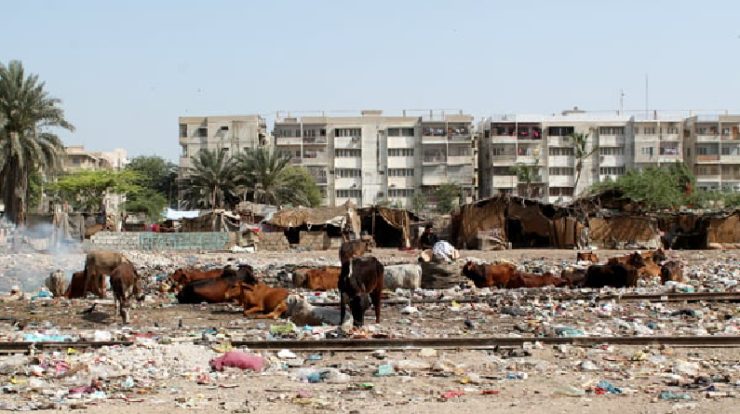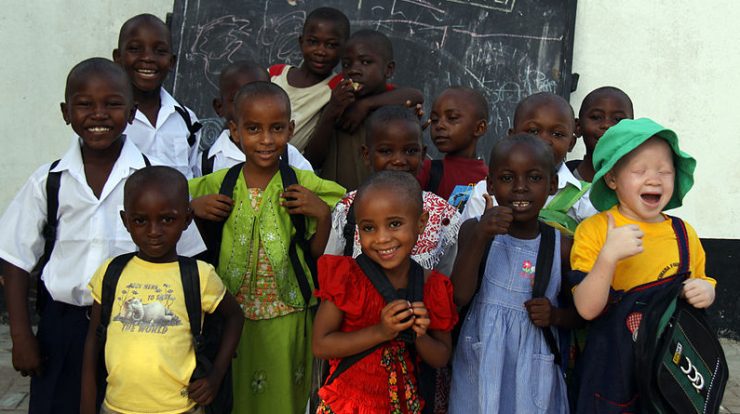
When we set out to learn about the lives of the people who live in the Jhuggi (shanty town) beneath a flyover in Karachi, Pakistan, we were unprepared to hear such a statement. Dia*, a young girl, spoke those words with an air of self-assurance. Despite experiencing empathy and guilt after meeting the young girl at the Jhuggi, we ultimately went back to our comfortable lives without Dia. Our lives are governed by such complex webs of social and spatial structures.
Under the “roof” of the flyover, next to a dirty water stream, is a Jhuggi where Dia lives. People’s right to the city, in particular, is being cruelly violated by the squalid conditions in which they must live. Naari*, Dia’s mother, is the reason her daughter is able to go to school despite their family’s dire circumstances. Dia is the only girl in her town to have this opportunity.
Dia’s maternal grandfather was the family’s driving force in the pursuit of higher education. The elder Naari wanted nothing more than to provide a good education for his daughter. Since he passed away when Naari was only in third grade, she was never able to finish her schooling. Nonetheless, Naari is determined to fulfil her daughter’s educational goals. Dia’s instructors agree that she is an exceptionally gifted student who regularly outperforms her peers.
In spite of this, Dia is not immune to the leviathan of patriarchy, which must be mentioned alongside any discussion of social structures. Naari’s son and ex-husband are not on board with Dia continuing her education. Naari’s always-cheerful face and bright eyes clearly tried to hide the pain when she shared this predictable but unfortunate fact.
Sell flower bracelets on traffic signals is how Naari makes most of her money. She barely scrapes by on a daily income of 250–300 rupees ($1.5–2.0). Some motorists donate money instead of purchasing bracelets. Naari’s daily income may go up a little thanks to donations, but she still sometimes loses money because the flowers she sells go stale.
The tuition at the school is currently at Rs. 1,500/- (approximately $10 USD) per month. The vast majority of the school’s students are from working-class backgrounds and adhere to a religious group that is statistically in the minority. The fact that one of the local organisations is committed to the welfare of people of the same faith as them is a plus in this situation. The group is responsible for paying the students’ tuition. Dia, however, is not eligible for this exemption because she practises a different religious minority and her mother must cover the cost on her behalf. The school’s only leniency is allowing Dia to enrol even if her tuition isn’t paid for several months. There are already insufficient funds for a school in Pakistan to make any additional accommodations due to its proximity to squatter settlements. Naari’s salary is insufficient for her to set aside 1,500 rupees per month, so she must rely on the generosity of the affluent.
Dia has long held a long-held ambition to enter the teaching profession. But the powerful forces of economic, social, patriarchal, and religious dispossession are pitted against her commitment to education. The internalised abjections are so deeply ingrained that even well-informed onlookers like us have trouble accepting them. So, the question is, how much longer can Naari keep Dia in school? Will Naari, Dia, and their children’s futures be different if they get an education? Will Dia be able to find work that affords her a safe place to live, safe drinking water, enough to eat, and improved opportunities for personal cleanliness and health? Given the established order, we are all aware of how unlikely such a shift is to occur.
Dia’s constant work brings to light the oppressive systems that give rise to and maintain the existence of Jhuggis. To make the necessary changes to the system, a concerted effort is required to organise a movement that will put pressure on policymakers and the state to dismantle these unequal socio-spatial structures and ensure equal access to education for all.


